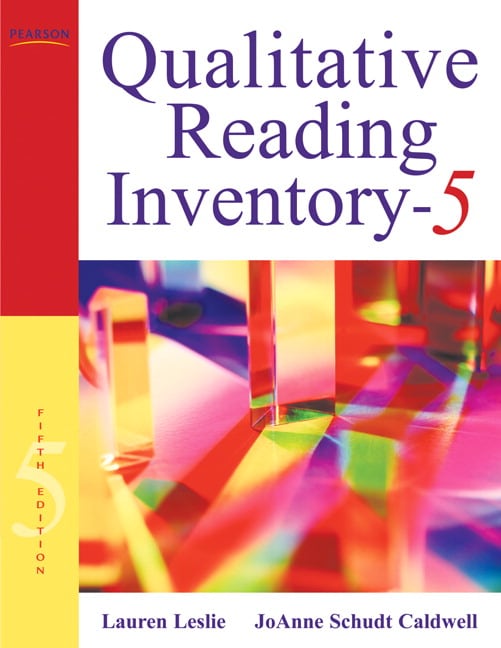
30.00$ - Purchase this E-book
Category : Higher Education
Contents Preface Section 1 Description of the Qualitative Inventory Section 2 A Research Perspective Reading Acquisition: A Developmental Process Factors Related to Comprehension Factors Related to Word Identification Factors Related to Use of an Informal Reading Inventory Section 3 Information Provided by the Qualitative Reading Inventory Finding Reading Levels Determining Reader Strengths and Needs Documenting Growth and Change Questions Regarding the Validity and Reliability of QRI-5 Section 4 Uses of Qualitative Reading Inventory 5-The Examiner as a Reflective Decision Maker Using the QRI-5 to Estimate Individual Instructional Reading Level Using the QRI-5 to Estimate Group Reading Level and Monitor Classroom Progress (Response to Intervention) Using the QRI-5 to Determine Reading Level Using the QRI-5 to Indicate Growth and Monitor Individual and Group Progress: Response to Intervention Using the QRI-5 to Verify a Suspected Problem Using the QRI-5 to Describe Specific Reading Behaviors as a Guide for Intervention Instruction (Response to Intervention: Tiers Two and Three) Section 5 Administration and Scoring of the Qualitative Reading Inventory-5 Preparation for Testing Summary Guidelines for Administration and Scoring Section 6 Administration and Scoring of the Qualitative Reading Inventory-5 The Word Lists Purpose for Administering the Word Lists Procedures for Administering the Word Lists Procedures for Scoring the Word Lists Section 7 Administration and Scoring of the Qualitative Reading Inventory-5 Assessment of Prior Knowledge Assessing Prior Knowledge Section 8 Administration and Scoring of the Qualitative Reading Inventory-5 The Passages Purposes for Administering the Passages Assessment Option General Procedures for Administering the Passages Passage Selection How to Find an Instructional Level Section 9 Administration and Scoring of the Qualitative Reading Inventory-5 Word Identification Index: Oral Reading Recording Oral Reading Miscues Counting Oral Reading Miscues Analyzing Oral Reading Miscues: Miscue Analysis Evaluating Automatically Section 10 Administration and Scoring of the Qualitative Reading Inventory-5 Comprehension Retelling Questions Criteria for Determining Reading Levels Section 11 Administration and Scoring of the Qualitative Reading Inventory-5 Assessing Strategic Reading Look-Backs Think-Alouds Assessing Note-Taking Ability Assessing Listening Comprehension Section 12 Summarizing the Results of the Qualitative Reading Inventory-5 Organizing the Data Section 13 Examples of Using the Qualitative Reading Inventory Using the QRI-5 to Estimate Individual Instructional Reading Level Using the QRI-5 to Estimate Group Instructional Reading Level and Monitor Classroom Progress (Response to Intervention) Using the QRI-5 to Determine Individual Instructional Reading Level Using the QRI-5 to Indicate Growth and Monitor Individual and Group Progress (Response to Intervention) Using the QRI-5 to Verify a Suspected Problem Using the QRI-5 to Describe Specific Reading Behaviors as a Guide for Intervention Instruction (Response to Intervention: Tiers Two and Three) Section 14 Test Materials Subject Word Lists Examiner Word Lists Pre-primer I Passages I Can (Pictures) I See (Pictures) Pre-primer 2 Passages Just Like Mom (Pictures) People at Work (Pictures) Pre-primer 3 Passages Lost and Found Spring and Fall Primer-Level Passages A Trip Fox and Mouse The Pig Who Learned to Read A Night in the City (Pictures) Who Lives Near Lakes? (Pictures) Living and Not Living Examiner Copies Level One Passages Mouse in a House Marva Finds a Friend (Pictures) A Bear and the Rabbit (Pictures) Air The Surprise (Pictures) The Brain and the Five Senses (Pictures) Examiner Copies Level Two Passages What Can I Get for My Toy? The Lucky Cricket (Pictures) Father’s New Game (Pictures) Whales and Fish The Family’s First Trip Seasons Examiner Copies Level Three Passages The Trip to the Zoo A Special Birthday for Rosa The Friend A New Friend from Europe Cats: Lions and Tigers in Your House Where Do People Live? Wool: From Sheep to You Examiner Copies Level Four Passages Johnny Appleseed Amelia Earheart Tomie dePaola Early Railroads The Busy Beaver Plant Structures for Survival Examiner Copies Level Five Passages Martin Luther King, Jr. Margaret Mead Patricia McKissack Farming on the Great Plains The Octopus How Does Your Body Take in Oxygen? Examiner Copies Modeling Passage for Think-Alouds The Mining Boom Level Six Passages Pele Abraham Lincoln The Early Life of Lois Lowry The Lifeline of the Nile Building Pyramids (Think-Aloud Passage) Temperature and Humidity Clouds and Precipitation (Think-Aloud Passage) Examiner Copies Upper Middle School Passages Literature Biddy Mason Malcolm X Social Studies Immigration-Part 1 Immigration-Part 2 (Think Aloud-Passage) Examiner Copies Science Life Cycles of Stars-Part 1 Life Cycles of Stars-Part 2 (Think-Aloud Passage) Examiner Copies High School Passages Literature Where the Ashes Are-Part 1 Where the Ashes Are-Part 2 Where the Ashes Are-Part 3 (Think-Aloud Passage) Social Studies World War I-Part 1 World War I-Part 2 World War I-Part 3 (Think-Aloud Passage) Science Characteristics of Viruses-Part 1 Characteristics of Viruses-Part 2 Characteristics of Viruses- Part 3 (Think Aloud Passage) Examiner Copies Section 15 Technical Development of the Qualitative Reading Inventory-5 The Pilot Development of the World-Identification Tests Development of Prior-Knowledge Assessment Tasks Development of Measures of Comprehension Development of the Think-Aloud Procedure Development of the Passages The Relationship between Oral Reading Accuracy and Comprehension Reliability and Validity Using the QRI-5 to Guide Instruction References Index Table of Contents
Get Qualitative Reading Inventory, 5th Edition by Lauren Leslie, Marquette University JoAnne Schudt Caldwell, Cardinal Stritch University


0 commentaires:
Enregistrer un commentaire